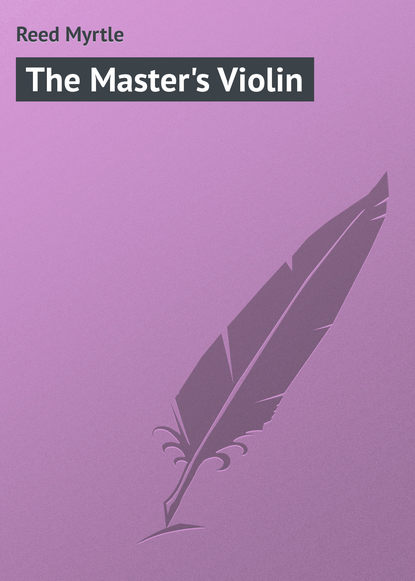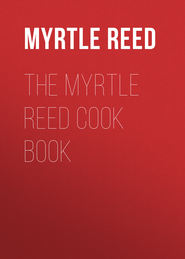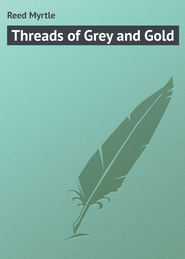По всем вопросам обращайтесь на: info@litportal.ru
(©) 2003-2024.
✖
The Master's Violin
Автор
Год написания книги
2017
Настройки чтения
Размер шрифта
Высота строк
Поля
“Yes.”
“Then,” said the Doctor, very gently, “when you have forgiven, the line will be blotted out. The one on the other side of it may be out of your reach forever, but the line will be gone.”
The idea was new to her, that she must forgive. She thought of it long afterward, when the house was as quiet as its sleeping mistress, and the pale stars faded to pearl at the hour of dawn.
The third day came; the end of that pitiful period in which we wait, blindly hoping that the miracle of resurrection may be given once more, and the stone be rolled away from our dead.
It was Doctor Brinkerhoff who had the casket closed before the strangers came, and afterward he told Margaret. “She would be thankful,” Margaret assured him, and his eyes filled. “Yes,” he answered, huskily, “I believe she would.”
They sat together at the head of the stairs, out of sight, and yet within hearing. Lynn sat at one end, still perplexed, and shuddering at the unpleasantness of it all. His mother’s hand was in his, and with her left arm she supported Iris, who leaned heavily against her shoulder, broken-hearted. On the other side of Iris was Doctor Brinkerhoff, austere and alone.
From below came the wonderful words of the burial service: “I am the resurrection and the life. He that believeth in me, though he were dead, yet shall he live.” It was followed by a beautiful tribute to Aunt Peace – to the countless good deeds of her five and seventy years.
Then there was silence, broken by the muffled sound of a string being tightened to harmonise with the piano. Swiftly upon the discordant note, the voice of a violin, strong, clear, and surpassingly sweet, rose in an Ave Maria.
Margaret started to her feet. “What is it?” she whispered, hoarsely.
“Mother,” said Lynn, in a low tone, “don’t. It is only Herr Kaufmann. We asked him to play.”
“The Cremona!” she muttered. “The Cremona – here – to-day!”
She lay back in her chair with her eyes closed and her mouth quivering. Lynn held her hand tightly, and Iris breathed hard. Doctor Brinkerhoff listened intently, his heart rejoicing in the beauty of it, because it was done for her.
Deep chords, full and splendid, sounded an ultimate triumph over Death. The music counselled acceptance, resignation, because of something that lay beyond – indefinite, yet complete restitution, when the time of its fulfilment should be at hand. Beside it, the individual grief sank into insignificance – it was the sorrow of the world demanding payment for itself from the world’s joy.
Something vast and appealing took the place of the finite passion, seeking hungrily for its own ends, and in the greatness of it, with heart uplifted, Margaret forgave the dead.
XIII
To Iris
“Daughter of the Marshes, the winds have told me you are sad. If I could, I would bear it for you, but there is no way by which one of us may take another’s burden.
“I wish I might come to you, but now, when you are troubled, I will not ask you for a signal, even for a flower on the gate-post. I would always have you happy, dear, if my love could buy it from the Fates – those deep eyes of yours should never be veiled by the mist of tears.
“Do you know where the marsh is, Iris? You have lived in East Lancaster for many years, so the gossips tell me, yet I doubt whether you could find it unless someone showed you the way. To reach it, you must follow the river, through all its turns and windings, for many a weary mile.
“Up in those distant hills, so far that I have never found it, the river begins – perhaps in some tiny pool of crystal clearness. It sings along over its rocky bed until it reaches a low, sandy plain, and here is the marsh. I was there the other day, just at sunset; my heart thrilled with the beauty of it because it is the beauty of you.
“How shall I tell you of the wonder of the marshes, those wide, watery plains embroidered with strange bloom? Tall, slender rushes stand there, bending gracefully when the wind passes, and answering with music to the touch. Have you ever heard the song of the marshes when the wind moves through the rushes and plays upon them like strings? Some day, I will take you there, and you shall listen, too, and tell me what you think it means.
“Here and there are pools, set like jewels among the rushes, with never a hint of growth. Sometimes you see a wide sweep of grass, starred with tiny yellow flowers, or a lily, surrounded by its leaves, drinking in the loveliness of the day and forgetting all the maze of slime and dark water through which it has somehow come. I think our souls are like that, Iris – we grow through the world, with all its darkness, borne upward by unfailing aspiration, until we reach the end, which we have been taught to call Heaven, but which is only blossoming in the light.
“But of all the radiant beauty of marshes, the best is this – that part of it which bears the purple flower of your name. In and out of the rushes, like the thread of a strange tapestry, it winds and wanders, hidden for an instant, maybe, but never lost. I have gathered an armful of the blossoms, and put my face down to them, closing my eyes, and dreaming that it was you – you whom I must ever hold apart as something too beautiful for me to touch – you, whom I can only love from afar.
“I have told you that I would come when the iris bloomed, but now, when the marsh is glorious with the purple banners, I dare not. It is not only because you are sad, though not for worlds would I trouble you now, but because I am afraid.
“Only in my wildest moments do I dare to hope – you were never meant for such as I. By day, I bow my soul before you in shame at my own unworthiness, but at night, like some flaming star which speeds across the uncharted dark, you light the barren country of my dreams.
“I think sometimes that I shall never dare to tell you; that it must be like this, year after year. If you knew your lover, who is so bold and yet so fearful, I think you would cast him aside in scorn. So it is better for me to believe, though that belief has no foundation, – better for me to hope than utterly to despair. Without you, I dare not think what life might be.
“Like the marsh, the years stretch out before me – a vast plain of which the uncertainty only is sure. They are full of strange pitfalls, of unsounded deeps and silences, of impassable barriers which I, disheartened and doubting, must one day meet face to face.
“Night lies upon it, and I cannot see the way. Storm beats upon me and turns me from my course. The clouded day ends in sunset, and the crystal pools, by which I thought to mark my path, become beacons of blood-red flame.
“The will o’ the wisp leads me into the mire, where the rushes cling tightly about me and keep me back. But the night wind blows from the east, where the dawn sleeps, and on the strings of the marsh grass breathes a little song. ‘Iris! Iris!’ it sings, then all at once my sore heart grows strangely glad, for whatever may come to me, I shall have the memory of you.
“Like the flags that glorify the marshes and spread their elfin sweetness afar, you shine upon the desert wastes of my life. I can never wholly lose you – you are there for always, and graven on my heart forever is the symbol of the fleur-de-lis.”
XIV
Her Name-Flower
Somehow, the days passed. Iris ate mechanically, and went about her household duties with her former precision. On Wednesday evening, Doctor Brinkerhoff came, as usual, and Margaret’s eyes filled at the sight of him.
Bent, old, and haggard, he came up the path, longing for his accustomed place in the house, and yet dreading to take it. Iris met him with a pitiful little smile, and he bowed over her hand for a moment, his shoulders shaking. Then he straightened himself, like a soldier under fire.
“Miss Iris,” he said, “we are bound together by a common grief. More than that, I have a trust to fulfil. She” – here he hesitated and then went on – “she asked me if I would not try to take the place of a father to you, and I promised that I would.”
“I have always felt so toward you,” answered Iris, in a low tone.
Lynn was quite himself again, and his cheerful talk enlivened the others, almost against their will. There was laughter and to spare, yet beneath it was an undercurrent of sorrow, for the wound was healed only upon the surface.
“It is hard,” said the Doctor, sadly, “but life holds many hard things for all of us. Perhaps, if we lived rightly, if our faith were stronger, death would not rend our hearts as it does. It is the common lot, the universal leveller, and soon or late it comes to us all. It remains to make our spiritual adjustment accord with the inevitable fact. There is so little that we can change, that it behooves us to confine our efforts to ourselves.”
“Life,” replied Lynn “is the pitch of the orchestra, and we are the instruments.”
Doctor Brinkerhoff nodded. “Very true. The discord and the broken string of the individual instrument do not affect the whole, except as false notes, but I think that God, knowing all things, must discern the symphony, glorious with meaning, through the discordant fragments that we play.”
So the talk went on, Lynn taking the burden of it and endeavouring always to make it cheerful. Margaret understood and loved him for it, but she, too, was sad. Iris sat like a stone, waiting, counting off the leaden hours as something to be endured, and blindly believing that rest would come.
“Everything,” said Margaret, after a long silence, “was as beautiful as it could be.”
Doctor Brinkerhoff understood at once. “Yes,” he sighed, “and I am glad. I think it was as she would have wished it to be, and I am sure she was pleased because I shielded her from the gaze of the curious at the end.” His face worked as he said it, but he took a pitiful pride in what he had done. Day by day he hugged this last service closer, because it was done through his own thought and his own understanding, and would have pleased her if she had known.
“Yes,” returned Margaret, kindly, “it was very thoughtful of you. It would never have occurred to me, and I know she would have been grateful.”
“Miss Iris?” said the Doctor, inquiringly.
The girl turned. “Yes?”
“She – she gave me a paper for you. Will you have it, or shall I read it to you?”
“Read it,” answered Iris, dully.
“It is in the form of a letter. She wrote it one day, near the end of her illness, and gave it to me, to be opened after her death.”
In the midst of a profound silence, he took an envelope from his pocket and broke the seal.
“Then,” said the Doctor, very gently, “when you have forgiven, the line will be blotted out. The one on the other side of it may be out of your reach forever, but the line will be gone.”
The idea was new to her, that she must forgive. She thought of it long afterward, when the house was as quiet as its sleeping mistress, and the pale stars faded to pearl at the hour of dawn.
The third day came; the end of that pitiful period in which we wait, blindly hoping that the miracle of resurrection may be given once more, and the stone be rolled away from our dead.
It was Doctor Brinkerhoff who had the casket closed before the strangers came, and afterward he told Margaret. “She would be thankful,” Margaret assured him, and his eyes filled. “Yes,” he answered, huskily, “I believe she would.”
They sat together at the head of the stairs, out of sight, and yet within hearing. Lynn sat at one end, still perplexed, and shuddering at the unpleasantness of it all. His mother’s hand was in his, and with her left arm she supported Iris, who leaned heavily against her shoulder, broken-hearted. On the other side of Iris was Doctor Brinkerhoff, austere and alone.
From below came the wonderful words of the burial service: “I am the resurrection and the life. He that believeth in me, though he were dead, yet shall he live.” It was followed by a beautiful tribute to Aunt Peace – to the countless good deeds of her five and seventy years.
Then there was silence, broken by the muffled sound of a string being tightened to harmonise with the piano. Swiftly upon the discordant note, the voice of a violin, strong, clear, and surpassingly sweet, rose in an Ave Maria.
Margaret started to her feet. “What is it?” she whispered, hoarsely.
“Mother,” said Lynn, in a low tone, “don’t. It is only Herr Kaufmann. We asked him to play.”
“The Cremona!” she muttered. “The Cremona – here – to-day!”
She lay back in her chair with her eyes closed and her mouth quivering. Lynn held her hand tightly, and Iris breathed hard. Doctor Brinkerhoff listened intently, his heart rejoicing in the beauty of it, because it was done for her.
Deep chords, full and splendid, sounded an ultimate triumph over Death. The music counselled acceptance, resignation, because of something that lay beyond – indefinite, yet complete restitution, when the time of its fulfilment should be at hand. Beside it, the individual grief sank into insignificance – it was the sorrow of the world demanding payment for itself from the world’s joy.
Something vast and appealing took the place of the finite passion, seeking hungrily for its own ends, and in the greatness of it, with heart uplifted, Margaret forgave the dead.
XIII
To Iris
“Daughter of the Marshes, the winds have told me you are sad. If I could, I would bear it for you, but there is no way by which one of us may take another’s burden.
“I wish I might come to you, but now, when you are troubled, I will not ask you for a signal, even for a flower on the gate-post. I would always have you happy, dear, if my love could buy it from the Fates – those deep eyes of yours should never be veiled by the mist of tears.
“Do you know where the marsh is, Iris? You have lived in East Lancaster for many years, so the gossips tell me, yet I doubt whether you could find it unless someone showed you the way. To reach it, you must follow the river, through all its turns and windings, for many a weary mile.
“Up in those distant hills, so far that I have never found it, the river begins – perhaps in some tiny pool of crystal clearness. It sings along over its rocky bed until it reaches a low, sandy plain, and here is the marsh. I was there the other day, just at sunset; my heart thrilled with the beauty of it because it is the beauty of you.
“How shall I tell you of the wonder of the marshes, those wide, watery plains embroidered with strange bloom? Tall, slender rushes stand there, bending gracefully when the wind passes, and answering with music to the touch. Have you ever heard the song of the marshes when the wind moves through the rushes and plays upon them like strings? Some day, I will take you there, and you shall listen, too, and tell me what you think it means.
“Here and there are pools, set like jewels among the rushes, with never a hint of growth. Sometimes you see a wide sweep of grass, starred with tiny yellow flowers, or a lily, surrounded by its leaves, drinking in the loveliness of the day and forgetting all the maze of slime and dark water through which it has somehow come. I think our souls are like that, Iris – we grow through the world, with all its darkness, borne upward by unfailing aspiration, until we reach the end, which we have been taught to call Heaven, but which is only blossoming in the light.
“But of all the radiant beauty of marshes, the best is this – that part of it which bears the purple flower of your name. In and out of the rushes, like the thread of a strange tapestry, it winds and wanders, hidden for an instant, maybe, but never lost. I have gathered an armful of the blossoms, and put my face down to them, closing my eyes, and dreaming that it was you – you whom I must ever hold apart as something too beautiful for me to touch – you, whom I can only love from afar.
“I have told you that I would come when the iris bloomed, but now, when the marsh is glorious with the purple banners, I dare not. It is not only because you are sad, though not for worlds would I trouble you now, but because I am afraid.
“Only in my wildest moments do I dare to hope – you were never meant for such as I. By day, I bow my soul before you in shame at my own unworthiness, but at night, like some flaming star which speeds across the uncharted dark, you light the barren country of my dreams.
“I think sometimes that I shall never dare to tell you; that it must be like this, year after year. If you knew your lover, who is so bold and yet so fearful, I think you would cast him aside in scorn. So it is better for me to believe, though that belief has no foundation, – better for me to hope than utterly to despair. Without you, I dare not think what life might be.
“Like the marsh, the years stretch out before me – a vast plain of which the uncertainty only is sure. They are full of strange pitfalls, of unsounded deeps and silences, of impassable barriers which I, disheartened and doubting, must one day meet face to face.
“Night lies upon it, and I cannot see the way. Storm beats upon me and turns me from my course. The clouded day ends in sunset, and the crystal pools, by which I thought to mark my path, become beacons of blood-red flame.
“The will o’ the wisp leads me into the mire, where the rushes cling tightly about me and keep me back. But the night wind blows from the east, where the dawn sleeps, and on the strings of the marsh grass breathes a little song. ‘Iris! Iris!’ it sings, then all at once my sore heart grows strangely glad, for whatever may come to me, I shall have the memory of you.
“Like the flags that glorify the marshes and spread their elfin sweetness afar, you shine upon the desert wastes of my life. I can never wholly lose you – you are there for always, and graven on my heart forever is the symbol of the fleur-de-lis.”
XIV
Her Name-Flower
Somehow, the days passed. Iris ate mechanically, and went about her household duties with her former precision. On Wednesday evening, Doctor Brinkerhoff came, as usual, and Margaret’s eyes filled at the sight of him.
Bent, old, and haggard, he came up the path, longing for his accustomed place in the house, and yet dreading to take it. Iris met him with a pitiful little smile, and he bowed over her hand for a moment, his shoulders shaking. Then he straightened himself, like a soldier under fire.
“Miss Iris,” he said, “we are bound together by a common grief. More than that, I have a trust to fulfil. She” – here he hesitated and then went on – “she asked me if I would not try to take the place of a father to you, and I promised that I would.”
“I have always felt so toward you,” answered Iris, in a low tone.
Lynn was quite himself again, and his cheerful talk enlivened the others, almost against their will. There was laughter and to spare, yet beneath it was an undercurrent of sorrow, for the wound was healed only upon the surface.
“It is hard,” said the Doctor, sadly, “but life holds many hard things for all of us. Perhaps, if we lived rightly, if our faith were stronger, death would not rend our hearts as it does. It is the common lot, the universal leveller, and soon or late it comes to us all. It remains to make our spiritual adjustment accord with the inevitable fact. There is so little that we can change, that it behooves us to confine our efforts to ourselves.”
“Life,” replied Lynn “is the pitch of the orchestra, and we are the instruments.”
Doctor Brinkerhoff nodded. “Very true. The discord and the broken string of the individual instrument do not affect the whole, except as false notes, but I think that God, knowing all things, must discern the symphony, glorious with meaning, through the discordant fragments that we play.”
So the talk went on, Lynn taking the burden of it and endeavouring always to make it cheerful. Margaret understood and loved him for it, but she, too, was sad. Iris sat like a stone, waiting, counting off the leaden hours as something to be endured, and blindly believing that rest would come.
“Everything,” said Margaret, after a long silence, “was as beautiful as it could be.”
Doctor Brinkerhoff understood at once. “Yes,” he sighed, “and I am glad. I think it was as she would have wished it to be, and I am sure she was pleased because I shielded her from the gaze of the curious at the end.” His face worked as he said it, but he took a pitiful pride in what he had done. Day by day he hugged this last service closer, because it was done through his own thought and his own understanding, and would have pleased her if she had known.
“Yes,” returned Margaret, kindly, “it was very thoughtful of you. It would never have occurred to me, and I know she would have been grateful.”
“Miss Iris?” said the Doctor, inquiringly.
The girl turned. “Yes?”
“She – she gave me a paper for you. Will you have it, or shall I read it to you?”
“Read it,” answered Iris, dully.
“It is in the form of a letter. She wrote it one day, near the end of her illness, and gave it to me, to be opened after her death.”
In the midst of a profound silence, he took an envelope from his pocket and broke the seal.











